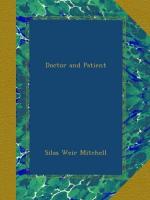In times of more serious peril and suffering, be assured that the best sympathy is that which calmly translates itself into the desire to be of practical use, and that the extreme of capacity to feel your woes would be in a measure enfeebling to energetic utility. This it is which makes a man unfit to attend those who are dear to him, or, to emphasize the illustration, to medically treat himself. He goes to extremes, loses judgment, and does too much; fears to hurt, and does too little. I once saw a very young physician burst into tears at sight of a burnt child, a charming little girl. He was practically useless for the time. And I have known men who had to abandon their profession on account of too great sensibility to suffering.
There is a measure of true sympathy which comes of kindness and insight, which has its value, and but one. Does it help you over the hard places? Does it aid you to see clearly and to bear patiently? Does it truly nourish character, and tenderly but, firmly set you where you can gain a larger view of the uses of pain and distress? That is the truest sympathy. Does it leave you feebler with mere pity? Does it accentuate pain and grief by simply dwelling on it with barren words? I leave you to say what that is. We have a certain gentle disrespect among us for the doctor who is described as, oh! so sympathetic,—the man who goes about his work with a pocket-full of banal phrases calculated to soothe and comfort the cravings of the wretched. The sick and feeble take gladly these imitation crumbs cast from the full table of the strong. But sometimes people of firm character revolt at such petty and economical charity. I heard a vigorous old Quaker lady say once, after a consultation, “Thee will do me a kindness not to ask me to see that man again. Thee knows that I don’t like my feelings poulticed.”




